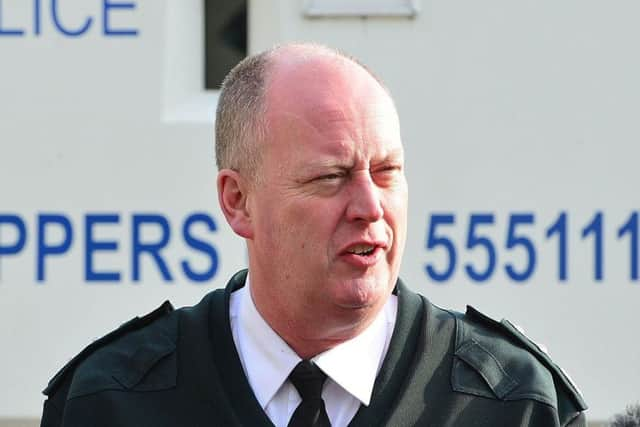PSNI chief: '˜Lack of forensic tests on weapons holds back Troubles probes'
and live on Freeview channel 276
George Hamilton, in an interview with the BBC, said the lack of forensic testing meant police investigating killings during the Troubles have “one hand tied behind our backs.”
The chief constable also said that around 96% of the investigations into around 1,700 killings are unlikely to result in convictions.
Advertisement
Hide AdAdvertisement
Hide AdReferring to the decommissioning of weapons, Mr Hamilton told BBC NI: “We have a decision taken by the government, agreed by the political parties at the time, for the decommissioning process.


“Now I’m not questioning that, I’m not criticising it, I’m just saying that a rich source of forensic evidence is ballistic forensic evidence that we can recover from firearms and munitions and bombs and so on that have been recovered.
“Now, if all of that’s been decommissioned, and there’s a legislative provision to say that none of it would be forensically examined before decommissioning, then we’re starting off with one hand tied behind our backs, so to speak.
“Certainly from a pure harvesting of forensic evidence, that is a major line of inquiry that is significantly reduced for us.”
Advertisement
Hide AdAdvertisement
Hide AdHe continued: “History has told us that there is about three or four percent of cases that we review and re-investigate that we get a criminal justice outcome on.
““That is because of the passage of time, reduction in the quality of evidence, memories fade, witnesses die, frankly, and as time passes the chances of a criminal justice outcome are significantly reduced.
“I don’t want to be defeatist about it. We, or whichever investigative body is doing this, should look at all of the evidence, go where the evidence takes us.
“All I’m saying is that historically, over the past 12, 14 years we’ve been working at this, the success rate for prosecutions is in around three or 4%, and there’s nothing that I’m seeing that would indicate that that’s likely to increase.”
Advertisement
Hide AdAdvertisement
Hide AdDespite the difficulties, the PSNI chief stressed the importance of the investigations.
“I think for a significant number of families and victims the possibility of a criminal justice outcome, of somebody being held to account in a criminal court for the murder of their loved one, is important to them and therefore it would be very difficult for me to support that, just out of care for those victims and the loss that those families have suffered,” he told the broadcaster.